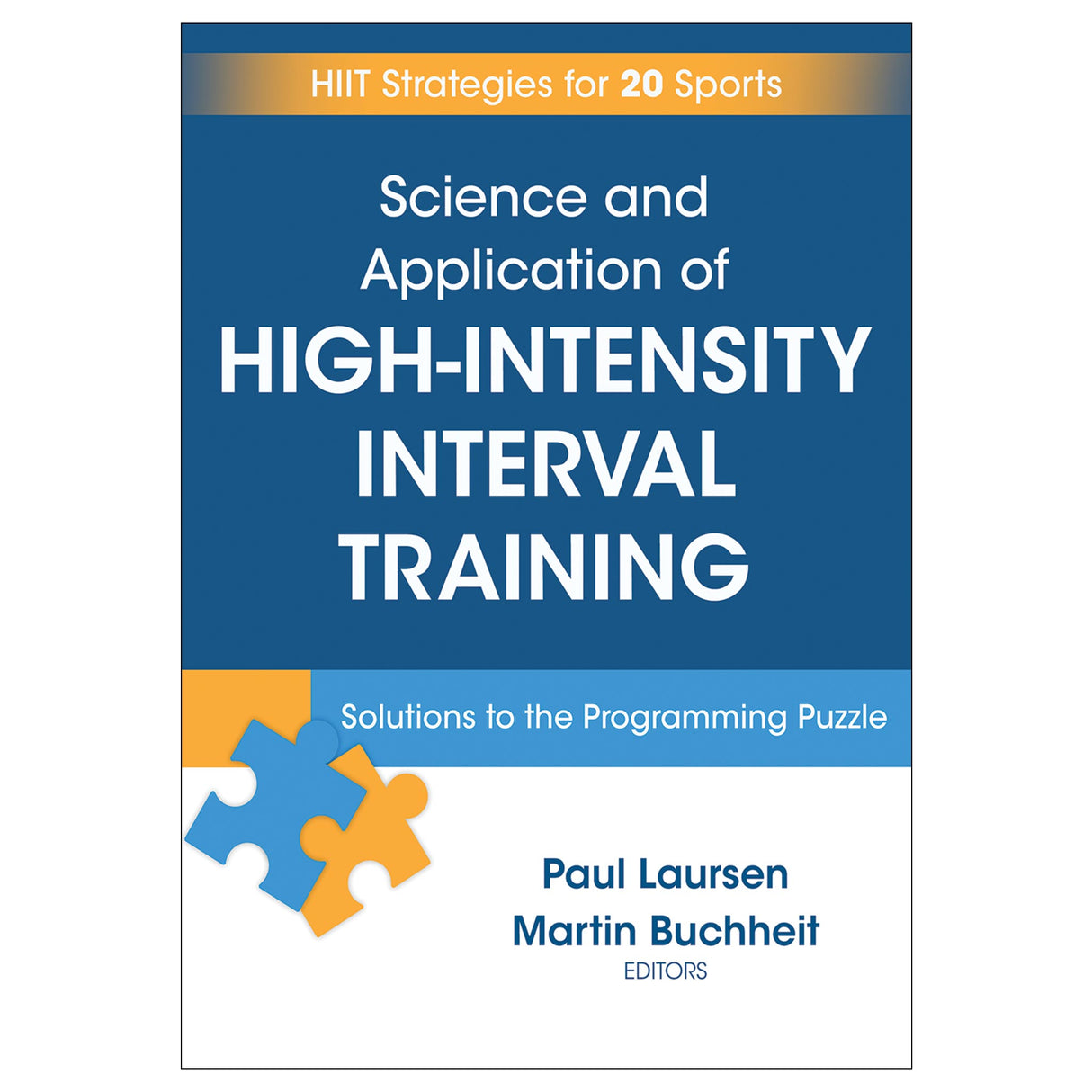Science and Application of High Intensity Interval Training
Solutions to the Programming Puzzle
Author: Paul Laursen, Martin Buchheit
$117.95 CAD
The popularity of high-intensity interval training (HIIT), which consists primarily of repeated bursts of high-intensity exercise, continues to soar because its effectiveness and efficiency have been proven in use by both elite athletes and general fitness enthusiasts. Surprisingly, few resources have attempted to explain both the science behind the HIIT movement and its sport-specific application to athlete training. That’s why Science and Application of High-Intensity Interval Training is a must-have resource for sport coaches, strength and conditioning professionals, personal trainers, and exercise physiologists, as well as for researchers and sport scientists who study high-intensity interval training.
Authors Paul Laursen and Martin Buchheit—both well-known, expert-level HIIT researchers as well as practitioners and endurance athletes—do a masterful job of blending science-based concepts of HIIT with practical application strategies. Laursen, Buchheit, and a team of highly qualified contributors—who bring hundreds of years of combined HIIT science and application experience from across all sports—have written Science and Application of High-Intensity Interval Training to provide practitioners and athletes an understanding of the foundational principles of HIIT programming. Chapters in the first section describe five types of training, how to manipulate HIIT variables to maximize improvements in physical performance, and how to incorporate HIIT into a general training program. Readers will also learn the influence HIIT can have on fatigue, stress, and an athlete’s overall health.
The final 20 chapters each focus on a different sport and are written by leading coaches or practitioners who have successfully applied HIIT principles at an elite level in their respective sport. These chapters describe specific ways to incorporate HIIT into a training regimen for everything from combat sports to endurance events to the most popular U.S. and international individual and team sports. Each chapter also contains sport-specific preparation and competition phases, an overall one-year training program, and a brief story of how the coach or practitioner who authored the chapter used HIIT to successfully prepare an athlete for a competition.
Knowing the proper ways to incorporate high-intensity interval training into a fitness or conditioning program is of vital importance: Not following proper protocols can lead to excessive and prolonged fatigue, illness, or injury. Science and Application of High-Intensity Interval Training is an essential guide for those who want to incorporate HIIT into their own training or their athletes’ programming.
Earn continuing education credits/units! A continuing education course and exam that uses this book is also available. It may be purchased separately or as part of a package that includes all the course materials and exam.
Audience
Applied reference book for sport coaches, strength and conditioning professionals, personal trainers, and exercise physiologists; reference manual for researchers and sport scientists who study high-intensity interval training.
Chapter 1. Genesis and Evolution of High-Intensity Interval Training
Paul Laursen and Martin Buchheit with contributions from Jean Claude Vollmer
Chapter 2. Traditional Methods of HIIT Programming
Martin Buchheit and Paul Laursen
Chapter 3. Physiological Targets of HIIT
Martin Buchheit and Paul Laursen
Chapter 4. Manipulating HIIT Variables
Martin Buchheit and Paul Laursen
Chapter 5. Using HIIT Weapons
Martin Buchheit and Paul Laursen
Chapter 6. Incorporating HIIT Into a Concurrent Training Program
Jackson Fyfe, Martin Buchheit, and Paul Laursen
Chapter 7. HIIT and Its Influence on Stress, Fatigue, and Athlete Health
Philip Maffetone, Paul Laursen, and Martin Buchheit
Chapter 8. Quantifying Training Load
Martin Buchheit and Paul Laursen
Chapter 9. Response to Load
Martin Buchheit, Paul Laursen, Jamie Stanley, Daniel Plews, Hani Al Haddad, Mathieu Lacome, Ben Simpson, and Anna Saw
Chapter 10. Putting It All Together
Paul Laursen and Martin Buchheit
Part II. Sport-Specific Application of High-Intensity Interval Training
Chapter 11. Combat Sports
Duncan French
Chapter 12. Cross-Country Skiing
Øyvind Sandbakk
Chapter 13. Middle-Distance Running
Jean Claude Vollmer and Martin Buchheit
Chapter 14. Road Running
Jamie Stanley and Carlos Alberto Cavalheiro
Chapter 15. Road Cycling
Marc Quod
Chapter 16. Rowing
Daniel Plews
Chapter 17. Swimming
Tom J. Vandenbogaerde, Wim Derave, and Philippe Hellard
Chapter 18. Tennis
Jamie Fernandez-Fernandez
Chapter 19. Triathlon
Daniel Plews and Paul Laursen
Chapter 20. American Football
Johann Bilsborough and Moses Cabrera
Chapter 21. Australian Football
Aaron Coutts, Joel Hocking, and Johann Bilsborough
Chapter 22. Baseball
Robert Butler and Matt Leonard
Chapter 23. Basketball
Xavi Schelling and Lorena Torres-Ronda
Chapter 24. Cricket
Carl Petersen and Aaron Kellett
Chapter 25. Field Hockey
Dave Hamilton
Chapter 26. Ice Hockey
Matt Nichol
Chapter 27. Handball
Martin Buchheit
Chapter 28. Rugby Union
Nick Gill and Martyn Beaven
Chapter 29. Rugby Sevens
Nick Poulos
Chapter 30. Soccer
Martin Buchheit, Mathieu Lacome, and Ben Simpson
“The mix of science and practical experience in Science and Application of High-Intensity Interval Training makes it the definitive guide to getting the most out of your interval training.”
Alex Hutchinson—Author of Endure: Mind, Body, and the Curiously Elastic Limits of Human Performance
“Science and Application of High-Intensity Interval Training, written by world-class scientists and practitioners, is an authoritative guide to both the evidence and the delivery of conditioning programs. It will become one of the most dog-eared books on my shelf.”
David Joyce—Head of Athletic Performance for the GWS Giants Football Club and Editor of High-Performance Training for Sports
“With Science and Application of High-Intensity Interval Training, Paul Laursen and Martin Buchheit provide the definitive training guide for athletes and coaches of all levels.”
Steve Magness—Head Coach for the University of Houston Cross Country Team and Author of The Science of Running





